There is a fine line between happiness and misery, as Dickens describes in David Copperfield. Copperfield’s landlord, Mr Micawber, was just on the wrong side of happiness by six pence.
Annual income: twenty pounds. Annual expenditure: nineteen and six.
Result : happiness.
Annuel income: twenty pounds. Annual expenditure: twenty-pound ought and six.
Result: misery
In a recent article called THE END OF THE US ECONOMIC AND MILITARY EMPIRE AND THE RISE OF GOLD, I stated: “Unsustainable deficits and galloping debt levels, combined with a crumbling military, are the perfect recipe for the end of an Empire.”
So, we are obviously not talking about a six-pence deficit in the case of the virtually bankrupt US empire but instead about a debt that is growing exponentially, now by several trillions of dollars annually.
History doesn’t just rhyme, but it repeats itself over and over and over again.
Let’s just look at the final stages of a debt crisis.
The table below shows the disastrous result of irresponsible governments during the last 54 years.
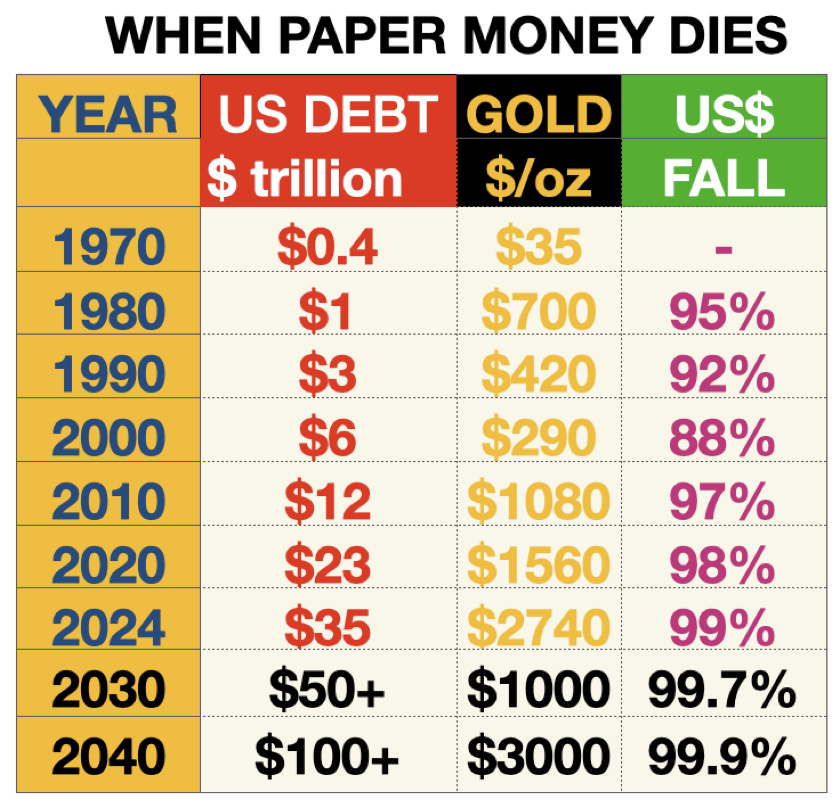
Governments never tell their people that they consistently destroy the value of the people’s money.
In 1971, when Nixon took away the dollar’s gold backing, he said: “YOUR DOLLAR WILL BE WORTH AS MUCH TOMORROW”.
If Tricky Dick was still alive today, he can, of course, argue that he didn’t lie.
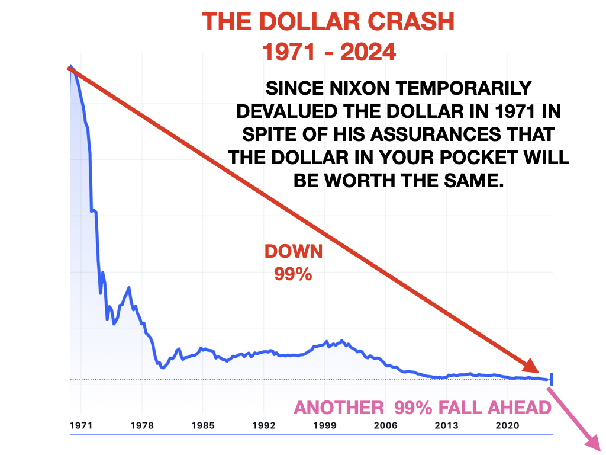
The price of gold has risen 78-fold since Nixon closed the gold window in 1971. The next phase will be one of acceleration:
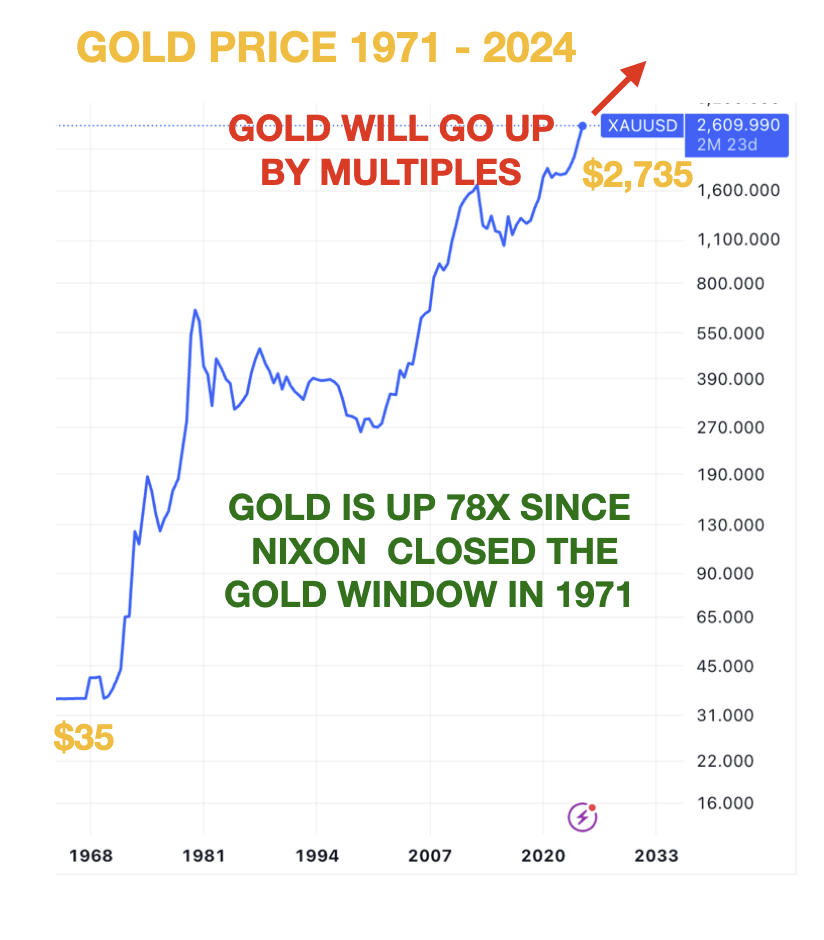
As I explain in this article, gold will rise by multiples in the coming years (obviously with corrections).
The Roman emperors who ruled the Roman Empire from 190 to 290 AD could argue the same, although the Denarius silver coin went from almost 100% silver content to zero.
The same was true for Friedrich Ebert, the president of the Weimar Republic in the early 1920s. He would have argued that a Mark is always a Mark, even when it has lost 100% of its purchasing power.
But gold doesn’t lie. Measured in real money, an ounce of gold in 1923, was worth 87 trillion Marks.
Until a currency totally dies in a hyperinflationary collapse, the deceit of the leaders is never revealed to public.
But we must never forget what Voltaire said in 1729 – “Paper money eventually returns to its intrinsic value – ZERO.”
When have we ever heard of a leader telling us that we must protect ourselves against the fraudulent destruction of our wealth by constantly debasing the value of money?
As Alan Greenspan said in 1967:
“In the absence of the gold standard, there is no way to protect savings from confiscation through inflation. There is no safe store of value…The financial policy of the welfare state requires that there be no way for the owners of wealth to protect themselves. This is the shabby secret of the welfare statists’ tirades against gold. Deficit spending is simply a scheme for the confiscation of wealth. Gold stands in the way of this insidious process. It stands as a protector of property rights. If one grasps this, one has no difficulty in understanding the statists’ antagonism toward the gold standard.”
Have a look at the tables above again.
These are but a few examples of thousands of currencies having been destroyed throughout history.
Governments create inflation by printing money and by allowing the financial system to create unlimited amounts of credit in the fractional reserve banking system.
In short, it means that banks and other financial institutions receive a deposit of, say, $100 and can lend 10 to 50X or $1,000 to $5,000 against that. Add derivatives, which allows the system to create trillions of dollars out of thin air.
This immoral and totally undisciplined financial model doesn’t just create unlimited leverage for financial players, whether they do it in banks, hedge funds, private equity, or any part of the shadow banking system.
This is how the total global debt of $350 trillion probably is in the quadrillions of dollars if we include all these creative “financial weapons of mass destruction”, as Warren Buffett called them. See the debt pyramid below.
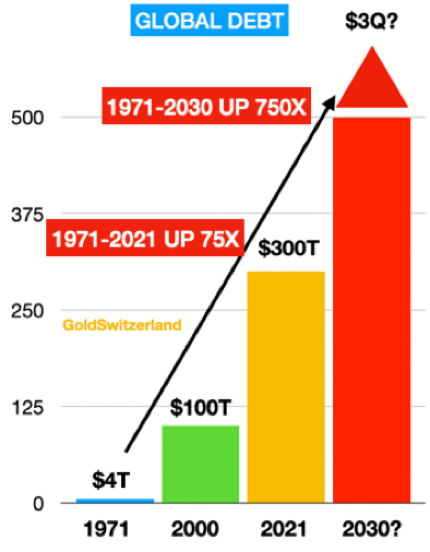
Until now, conventional investment assets like stocks and property have been excellent \protection as they have gone up substantially as a result of the constant growth of credit and money supply.
So, this massive liquidity injection has created colossal paper fortunes for most investors.
When Will It End
That party is now coming to an end. Valuations of these bubble assets are now at perilous levels. History tells us that manias always end badly.
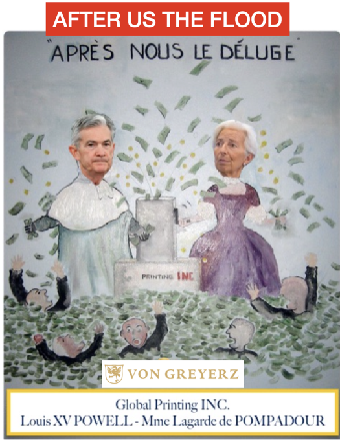
But history doesn’t tell us when they will end. Will it be tomorrow, in six months or several years?
So, can we forecast the end?
Well, the most exact of all sciences is hindsight. With the benefit of this very accurate method, many people will tell us afterwards that the crash was bound to happen.
Sadly, no one realises that this time, dip buying will fail. Still, investors will buy dip after dip until they are exhausted. So when the market has fallen further than anyone expects most investors will sit tight based on greed and FOMO (fear of missing out). And just at that point, the biggest wealth destruction in history will take place.
Very few will think of alternative investments like gold to preserve wealth until it is too late.
And at that point, gold will have gone up so much in value with very few participating. Everyone will find gold too expensive. Very few will realise that gold isn’t going up, but paper money is down.
A Fascinating Journey to the Pot of Gold
I was born in Sweden and have dual Swedish / Swiss citizenship. I started my career in banking in Switzerland and then in corporate life in the UK.
In 1972, I was offered a job by a bank client, a small listed retail company called Dixons. I became Finance Director in 1974 at the age of 29. I was thereafter appointed Vice-Chairman.
We made the company to be the biggest electric and consumer electronic retailer in the UK and a FTSE 100 company.
It was an incredibly stimulating time building a dynamic business both organically and by acquisition. As business leaders we experienced adversity as a positive challenge. We sold electrical goods including televisions by candle light in 1974 when there was only electricity for 3 days per week due to a major coal miners’ strike. And we grew by contested takeovers of companies much bigger than ourselves.
Corporate life in a dynamic business is extremely exciting. But since I started that career in my late 20s, I felt it was time to do my own thing in my early 40s.
So, in the 1990s, I started investing my own funds as well as the capital of some wealthy friends.
I have always been interested in understanding risk and protecting the downside, both in banking and in corporate life.
In the 90s I started to be concerned about the growth of debt and derivatives. So I was looking at the best ways of preserving wealth.
Having experienced Nixon closing the gold window and the subsequent 24X growth of the gold price from $35 in 1971 to $850 in 1980, I had always been fascinated by gold.
Seeing debt and especially derivatives growing with no shackles and especially tech stocks becoming a massive bubble in the late 1990s, I was convinced that gold par excellence was the best asset to preserve wealth.
Having experienced gold go from $35 in 1971 and then correct from $850 in 1980 to $250 in 1999, I was closely watching the gold price for confirmation of a bottom. So in early 2002 we invested heavily into physical gold at $300 for ourselves and a group of co-investors that we were advising.
We haven’t looked back since and only increased our investment in gold over the years. Since we had created a superb system for buying and storing physical gold based on our stringent wealth preservation principles, people around the world started to ask for help. That led to the creation of Matterhorn Asset Management / GoldSwitzerland. The name was changed at the beginning of this year to VON GREYERZ AG.
Today we have clients in over 90 countries and are probably the biggest company in the world outside the banking system for HNWIs acquiring and storing gold.
We have been actively involved in gold for soon a quarter of a century and experienced almost 10X growth in the gold price since we started the business.
Still, we believe that the gold journey is only starting now.
Why, you may ask.
Well, gold is the best-performing asset class in this century, better than the S&P including reinvested dividends and still NOBODY owns gold.
Only 0.5% of global financial assets are invested in gold.
It is totally incomprehensible that gold has gone up 9.5X. This century, investors are not even looking at it.
So why is gold still so unloved?
Gold held in the investor’s name in safe vaults and jurisdictions outside the financial system is the ultimate form of wealth preservation.
But asset managers and banks dislike gold since they can’t churn commission with an asset that can’t be turned over at regular intervals. So no commission and no performance fees. Also, very few people understand gold.
In my view, gold is now ready to explode, measured in paper money.
I have explained the reason for gold’s coming explosion in many articles, including this recent one.
But remember that gold never goes up. All it does is to reflect governments’ and central banks’ destruction of fiat money.
Gold is just stable purchasing power in a world where goods and services go up exponentially in price because the money you buy it with always goes to ZERO.
Having said that, I do expect gold to do better than just keeping pace with purchasing power in the next few years.
Again let me make it clear – no paper money has ever, ever, ever survived in history (in its original form).
With such a perfect record of destroying money, why should we believe that the FED, ECB, BoE (Bank of England) or BoJ (Bank of Japan) or any other central bank will stand a chance to save the global financial system with $2-3 quadrillion of toxic exposure?
Well, I can personally guarantee that they won’t.
Remember that destroying the value of money by printing quadrillions is a technical default, although no central bank will call it that.
And creating digital money for the central bank is just a technical diversion.
Debt can never be written off without totally destroying the value of the assets it supports. That is how a balance sheet or double-entry accounting works.
So, this global financial system will collapse, as they all have. But this is the first time it has been global.
BRICS countries will also suffer, but not as much as the West.
The coming era will be commodity-based. Take Russia, for example, with $85 trillion of natural reserves. They will be one of the major winners in the coming commodity era. They also have low debts.
So, let’s look at the risks.
War Risk
There are today two major wars that could lead to global conflicts and potentially nuclear war.
The US is directly involved in both conflicts with weapons and money, although US territory is not threatened. The best chance for the world to avoid a global conflict is for Trump to be elected. He has both proven and stated that he will stop the war, especially in Ukraine. Harris will not change the direction of Biden and the neocons, which means a much higher risk of global conflict.
Collapse of the Global Financial System
As outlined above, this collapse is inevitable. The only question is when and to what extent. I strongly believe that most of the BRICS countries will suffer less from the collapse and emerge from it much faster.
The West, with its massive debt bubble and moral decadence, has already started a major secular decline that could last for centuries.
Wealth Preservation
Gold is not the panacea for the problems outlined above. However, history proves that in any period of crisis, gold has always stood as a protector, both financially and for personal safety.
But what is more important than anything else is protecting and helping family and friends.
Strong family ties and a group of close friends are more important than all gold in the world.
Gold, for the instant, lost its lustre in his eyes, for there were countless treasures of the heart which it could never purchase.
Original source: VON GREYERZ
Reproduction, in whole or in part, is authorized as long as it includes all the text hyperlinks and a link back to the original source.
The information contained in this article is for information purposes only and does not constitute investment advice or a recommendation to buy or sell.

















